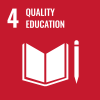In 2015, a set of Sustainable Development Goals (SDGs) will succeed the Millennium Development Goals as reference goals for international development for the period 2015-2030. Education was identified as a standalone goal (SDG4). Epistemic communities have documented a number of links between education and other SDG areas, and policy makers have long recognized many of them. Based on an exhaustive content analysis of 40 global reports, this paper examines how well such links are represented in flagship publications of the United Nations system. Taken together, the reports identify links between education and all the SDGs, with the notable exception of SDG 14 on oceans. For most of the SDGs, causal links are identified in both directions, from education to other goal areas and vice-versa. The most emphasized connections are those between education and growth (SDG8) and gender (SDG5). By contrast, links with energy (SDG7), water (SDG 6), cities (SDG 11), sustainable consumption and production (SDG 12) and climate change (SDG 13) receive much less attention in the sum of UN flagship publications. While some causal links are identified and highlighted as important, relevant constraints are sometimes not extensively discussed, and few concrete policy options to act on those links are provided. Going forward, it would be important to assess whether the messages contained in UN flagship reports adequately reflect the state of scientific knowledge and the lessons learnt from development programs that focus on education in relation to specific SDGs. The systematic analysis provided here can offer a basis for an integrated analysis of policy priorities for education as a whole.
How well are the links between education and other sustainable development goals covered in UN flagship reports? A contribution to the study of the science-policy interface on education in the UN system
Working Paper Date:
Category: Sustainable Development
Document Symbol: ST/ESA/2015/DWP/146
JEL Classification: I31, I38, and Z13
Keywords: Education, Sustainable development goals, science-policy interface, scientific assessments, policy integration, sustainable development.
Working Paper File:
1597341724.8015.pdf
1.42 MB
 Welcome to the United Nations
Welcome to the United Nations
